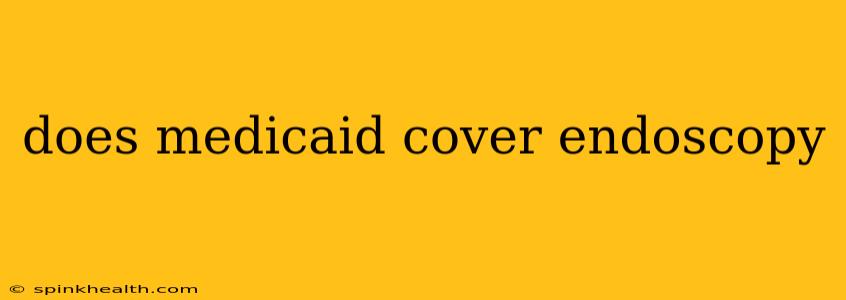Does Medicaid Cover Endoscopy? Navigating the Maze of Healthcare Coverage
The question, "Does Medicaid cover endoscopy?" is a common one, filled with understandable anxiety. Facing a potential health issue and worrying about the financial burden is stressful, and understanding your insurance coverage is a crucial first step. Let's unravel this together, exploring the complexities of Medicaid and its coverage of endoscopy procedures.
My name is Sarah, and I've spent years working in healthcare administration, helping people understand their insurance options. While I can't give specific legal or medical advice (always consult with your doctor and Medicaid provider for personalized guidance), I can share my knowledge and experience to shed light on this important topic. This isn't a simple yes or no answer, but rather a journey through the factors that influence Medicaid's coverage of endoscopy.
What is an Endoscopy, and Why Might You Need One?
Before diving into Medicaid coverage, let's briefly define endoscopy. An endoscopy is a medical procedure using a thin, flexible tube with a camera (an endoscope) to examine the inside of your body. There are different types of endoscopies, depending on the area being examined:
- Upper endoscopy (esophagogastroduodenoscopy or EGD): Examines the esophagus, stomach, and duodenum (the first part of the small intestine).
- Colonoscopy: Examines the large intestine (colon) and rectum.
- Sigmoidoscopy: Examines the lower part of the large intestine (sigmoid colon and rectum).
You might need an endoscopy if your doctor suspects problems like:
- Gastrointestinal bleeding
- Abdominal pain
- Difficulty swallowing
- Changes in bowel habits
- Unexplained weight loss
- Screening for colon cancer
Does Medicaid Cover Endoscopy? The Nuances of Coverage
The simple answer is: potentially, yes. Medicaid coverage for endoscopy varies significantly depending on several factors:
-
Your State's Medicaid Program: Medicaid is a joint federal and state program, meaning each state administers its own Medicaid program with its own rules and regulations. Coverage for specific procedures, including endoscopy, can differ from state to state. Some states may have more restrictive coverage than others.
-
Medical Necessity: Medicaid generally covers medically necessary procedures. This means the endoscopy must be deemed necessary by your doctor to diagnose or treat a specific medical condition. If the procedure is deemed elective or not medically necessary, it might not be covered.
-
Your Specific Medicaid Plan: Even within a state, different Medicaid managed care organizations (MCOs) may have slightly different coverage policies. You'll need to check with your specific Medicaid plan to understand its precise coverage for endoscopy.
-
Pre-authorization: Many Medicaid plans require pre-authorization for certain procedures, including endoscopy. This means your doctor needs to get approval from your Medicaid plan before the procedure is performed. Failure to obtain pre-authorization could lead to denied claims.
What Happens if Medicaid Doesn't Cover the Entire Cost?
Even if Medicaid covers some of the endoscopy cost, you might still have out-of-pocket expenses. These could include:
- Copayments: A fixed amount you pay each time you receive a covered service.
- Coinsurance: A percentage of the cost you pay after you've met your deductible.
- Deductible: The amount you must pay out-of-pocket before your insurance coverage begins.
How to Determine Your Medicaid Coverage for Endoscopy
The best way to find out if your Medicaid plan covers endoscopy and what your out-of-pocket costs will be is to:
- Contact your Medicaid provider directly: Call the customer service number on your Medicaid card or visit their website.
- Review your plan's benefit summary: This document outlines your coverage for various services.
- Ask your doctor's office: They are familiar with Medicaid procedures and can help you understand what to expect.
Frequently Asked Questions (FAQs)
H2: What if I need a follow-up endoscopy?
Medicaid coverage for follow-up endoscopies usually depends on the medical necessity, just like the initial procedure. Your doctor will need to justify the need for the follow-up to your Medicaid provider.
H2: Are there any resources available to help with Medicaid-related costs?
Yes, many organizations offer assistance with medical bills and navigating the healthcare system. Contact your local health department or search online for patient advocacy groups in your area.
H2: Can I appeal a denied claim?
Yes, if your Medicaid claim for endoscopy is denied, you typically have the right to appeal the decision. The appeal process will be outlined in your Medicaid plan's materials.
Remember, obtaining a clear understanding of your Medicaid coverage is crucial before undergoing any medical procedure. Don't hesitate to ask questions and seek clarification. Your health and financial well-being are paramount. By proactively communicating with your doctor and your Medicaid provider, you can navigate the process with confidence.

